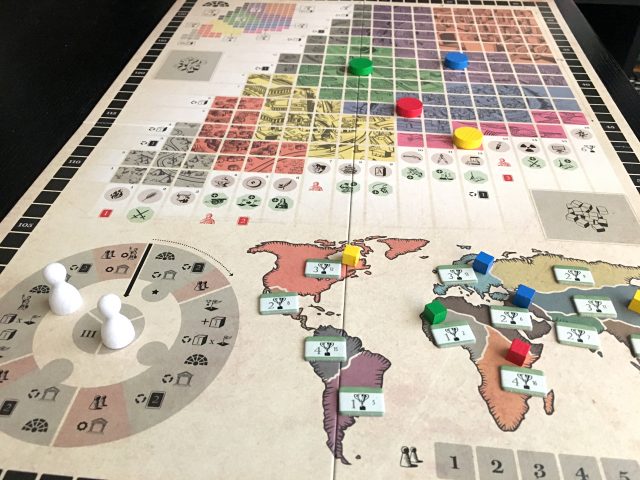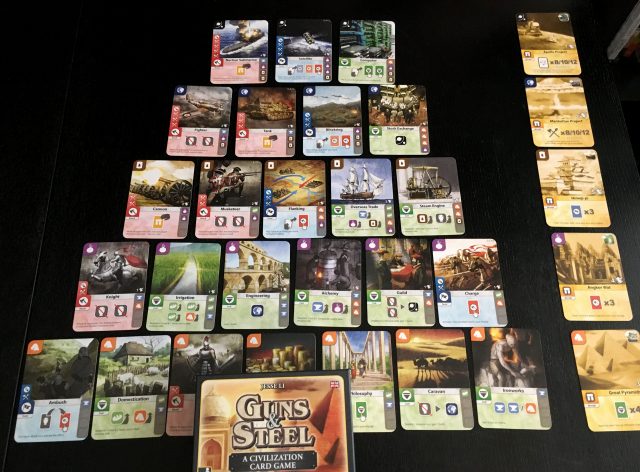Last week I began tracing the history of 4X tabletop games influenced by the genre-defining 1991 release of Sid Meier’s Civilization. I continue this week with the release, almost twenty years later, of the most successful boardgame version thus far:
Sid Meier’s Civilization: The Boardgame (2010): This one I liked. I liked it quite a lot. Civ2010 was designed by Kevin Wilson (Game of Thrones: The Cards Game, Descent (1st Ed), Arkham Horror (Fantasy Flight Edition)) whose CV shows he’s capable of designing Big games with robust rules. Confusingly, although Civ5 launched in 2010, the box art (if not the interior graphics) was lifted from Civ4. Wilson came closest to duplicating the SMC experience, complete with modular square-grid map tiles which began mainly face-down, multiple paths to victory, a card-based combat system with a rock-paper-scissors mechanic, a tech pyramid (not a tree, exactly, but better than nothing), and special player/Civ powers. The game was a beast to teach–I know, having had to do it several times. I finally managed to get the rulesplanation down to forty minutes–exhausting. Still, I felt I’d found my One. But then the expansions started coming: Fame and Fortune in 2011 and Wisdom and Warfare in 2013. Each added new civs to the mix, but also bolted more chrome onto the chassis, making it clunkier. Tellingly, Wisdom and Warfare lists two other designers as well as Wilson, so it’s hard to know how much of a hand he had in it. Civ2010 remains popular, sitting just outside BGG’s top 100, but for me the bloom had come off the rose. It didn’t feel all of one piece any more. Plus, playtime had expanded by up to an hour; for me, the game now outstayed its welcome at the table, especially at higher player counts.
 Innovation (2010): What if you smooshed together SMC and Fluxx? And why would anyone do that? Well, this game answers both questions. As the title gives away, this game is all about the history of technology. There’s no map, no dudes on a map, nope, it’s all cards, with each card representing a particular discovery. Innovation is hard to summarize and describe, as its designer (Carl Chudyk, best-known perhaps for 2005’s excellent Glory to Rome) infused it with unique mechanisms and multiple paths to victory. Suffice to say the game takes place over ten Periods, each represented by a separate deck of cards. Victory is usually achieved by Dominating a certain number of Periods or having the most Influence at the end of the game–but you must always be on guard for players who appear to be aiming for sudden-death victory conditions which appear on certain later-Period cards (totally unfair, I say!). Clearly, this is a game that rewards knowing all the cards very well, so that you can predict and prepare for various combos and strategies. So I was unfair to compare it to Fluxx, I know…It’s actually a fun rewarding game with a surprising amount of strategy–but be prepared to be very bewildered for your first four or five plays. The expansion, Echoes of the Past, adds even more replayability, strategies, and/or chaos.
Innovation (2010): What if you smooshed together SMC and Fluxx? And why would anyone do that? Well, this game answers both questions. As the title gives away, this game is all about the history of technology. There’s no map, no dudes on a map, nope, it’s all cards, with each card representing a particular discovery. Innovation is hard to summarize and describe, as its designer (Carl Chudyk, best-known perhaps for 2005’s excellent Glory to Rome) infused it with unique mechanisms and multiple paths to victory. Suffice to say the game takes place over ten Periods, each represented by a separate deck of cards. Victory is usually achieved by Dominating a certain number of Periods or having the most Influence at the end of the game–but you must always be on guard for players who appear to be aiming for sudden-death victory conditions which appear on certain later-Period cards (totally unfair, I say!). Clearly, this is a game that rewards knowing all the cards very well, so that you can predict and prepare for various combos and strategies. So I was unfair to compare it to Fluxx, I know…It’s actually a fun rewarding game with a surprising amount of strategy–but be prepared to be very bewildered for your first four or five plays. The expansion, Echoes of the Past, adds even more replayability, strategies, and/or chaos.
Nations (2013): Nations has several things going for it. You can play it at several difficulty levels–even at the same time, which provides a nice way of evening things out between veterans and n00bs. There is less stabby-stabby take-that (again, not a plus for everyone). It’s less fiddly, components-wise. It’s less prone to analysis paralysis. It’s easier to teach and learn, and less of a learning curve. Think of this as Through the Ages Lite and you won’t be too wrong.
Patchistory (2013): I think I first heard about this game on the BGG forums. I ordered it direct from Korea (where the publisher and designers are from) thinking it would never get distributed in North America–and, once again, I got proved wrong. Anyway, what I saw fascinated me: a civ-building game where players bid on cards to “patch” onto the growing game-board. Most of the cards were subdivided into terrain types, but some had leaders or Wonders on them. There were rules for trade routes, combat, diplomacy, and voting for scoring methods. Nothing in the way of a tech tree, but still–had to try it. The reality is that the cards warped slightly, making the board extremely touch-sensitive (and not in a good way), the rules needed some editing for clarity and English, and it just didn’t gel with me. Definitely the bones of a good game with some great individual parts, maybe should’ve tiles instead of cards and some tightening up of the rules.
The Golden Ages (2014): 2014 was a sweet year for civ games, with three really good ones entering the market. The first one I’ll talk about is The Golden Ages, which despite a somewhat ugly cover (by the otherwise-talented Alexandre Roche—maybe he had an off day) is a solid game with a modular map, a tech system reminiscent of Endeavor, and an action-selection-slash-worker-placement system that was nothing special but got the job done. The game plays quickly and smoothly, and the expansion Cults & Culture makes it even better by adding inventions, Masterpiece cards, religions, and a culture track with extra bonuses—but it costs almost as much as the base game, so be warned.
 Historia (2014): This one hits a sweet spot. You’ve got a complex tech tree which dominates the board—it’s really more of a tech “matrix” along which your civ moves. You’ve got a map of the world (a tiny one squeezed into the remaining part of the board) that you put your cubes on to show ownership of different regions. You’ve got a cool card-driven action selection system that’s really tight and well-implemented. You’ve got combat, Wonders, and Aa solo mode that’s damn hard to beat but never seems “unfair”. Plus there are little expansions available which add just enough chrome to spice things up but not overwhelm you. I really feel Historia deserved more attention than it got.
Historia (2014): This one hits a sweet spot. You’ve got a complex tech tree which dominates the board—it’s really more of a tech “matrix” along which your civ moves. You’ve got a map of the world (a tiny one squeezed into the remaining part of the board) that you put your cubes on to show ownership of different regions. You’ve got a cool card-driven action selection system that’s really tight and well-implemented. You’ve got combat, Wonders, and Aa solo mode that’s damn hard to beat but never seems “unfair”. Plus there are little expansions available which add just enough chrome to spice things up but not overwhelm you. I really feel Historia deserved more attention than it got.
Nations: The Dice Game (2014): This gets its own entry because despite having one of the same designers on board and a similar graphical feel, N:TDG’s streamlined (though more luck-dependent) dice-play is almost as satisfying as its big brother with the added benefit of being solo-playable. You’re drafting tiles instead of cards, and leaders give you rerolls to mitigate bad luck. The game is more portable, but the tradeoff is more limited replayability, because there are fewer tiles in all. Through the Ages Very Lite, anyone? Still, as a gateway game it never overstays its welcome.
 Guns & Steel (2015): The title got me on the basis of its namecheck of Jared Diamond’s 1997 non-fiction best-seller (which I loved). Then I was hooked by its promise of simulating 5000 years of history with just 45 cards–Tardis game, anyone? G&S’s focus, like Innovation, is on technology–no map, no special civ powers. The game revolves around those 45 cards, which have multiple face-up and face-down uses: resources, triggers, actions, and units. The aim is to collect the most VP’s through your techs and Wonders–but Wonders can (and usually are) stolen, so don’t grow too attached to them, unless you can put together a great defence. The Renaissance expansion in 2016 added 45 more cards to double your pleasure and added in some new rules into the mix. The most portable game on this list and plays quickly, too.
Guns & Steel (2015): The title got me on the basis of its namecheck of Jared Diamond’s 1997 non-fiction best-seller (which I loved). Then I was hooked by its promise of simulating 5000 years of history with just 45 cards–Tardis game, anyone? G&S’s focus, like Innovation, is on technology–no map, no special civ powers. The game revolves around those 45 cards, which have multiple face-up and face-down uses: resources, triggers, actions, and units. The aim is to collect the most VP’s through your techs and Wonders–but Wonders can (and usually are) stolen, so don’t grow too attached to them, unless you can put together a great defence. The Renaissance expansion in 2016 added 45 more cards to double your pleasure and added in some new rules into the mix. The most portable game on this list and plays quickly, too.
CVilizations (2016): I math-traded for this game but never got it to the table. It was too cartoony-looking for my “serious” gamer friends and too heavy for my “I’ll play it if you can teach it in ten minutes” friends. There was simultaneous action selection…yeah, honestly, I read the rules once and I don’t remember very much about it—except that the box was way too big for what was inside, which always bugs me. I know I’m giving it short shrift, but with so many good or great civ games on the market I guess I’m getting a little impatient.
Whew! That was quite a journey, wasn’t it? I hope now you see that Civilization: A New Dawn carries quite a bit of “history” with it, and quite a lot of expectations as well. Next week I’ll look at the game itself and tell you what I think.
Great articles, thank you!
No “clash of cultures” ?
And if you had to pick one heavy and one medium favorites?
I almost put Clash of Cultures on—but technically it doesn’t qualify since it only covers the ancient and classical periods. Good game, tho!
It is worth trying Nations: tDG with the new Unrest expansion. It is everything I want a short 3x game to be.